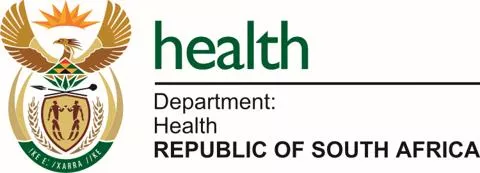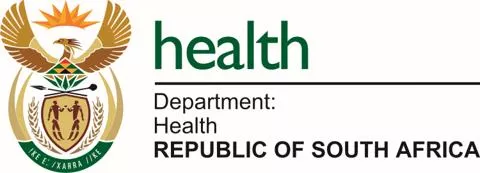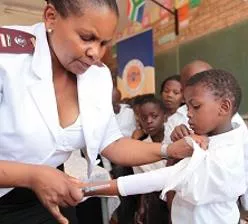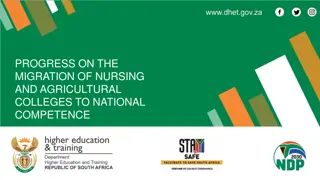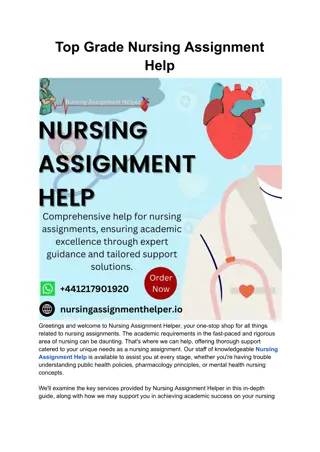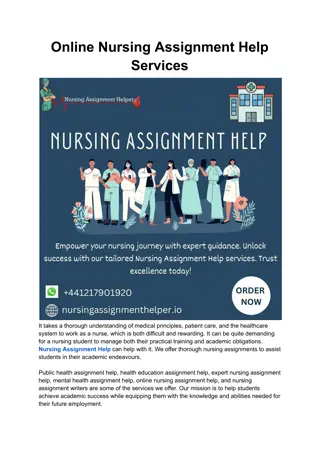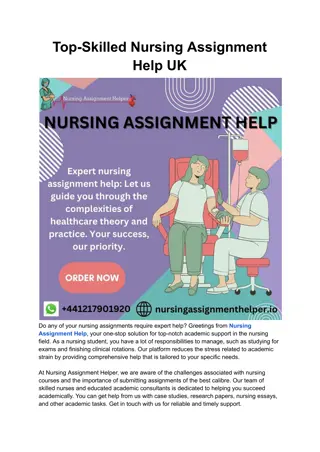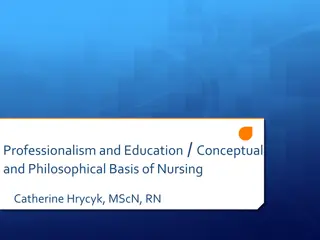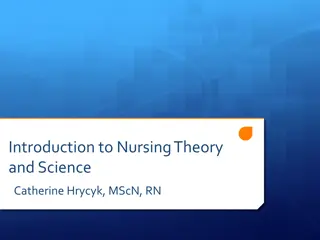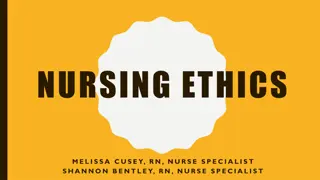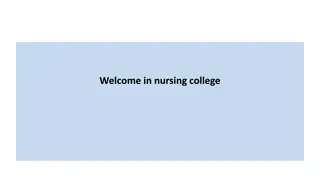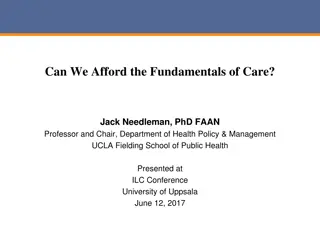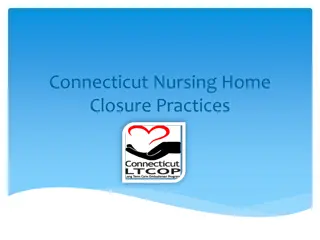Progress in Nursing Colleges Re-opening and Rationalization
The briefing outlines the historical context of nursing colleges pre- and post-1994 in South Africa, focusing on efforts to re-open and rationalize these institutions. It discusses the closure and re-opening of specific colleges in provinces like Eastern Cape and Northern Cape, as well as the rationalization process in Gauteng and ongoing changes in North-West. The presentation emphasizes collaboration with the Department of Higher Education and Training (DHET) to advance nursing education programs and curriculum updates.
Download Presentation

Please find below an Image/Link to download the presentation.
The content on the website is provided AS IS for your information and personal use only. It may not be sold, licensed, or shared on other websites without obtaining consent from the author. Download presentation by click this link. If you encounter any issues during the download, it is possible that the publisher has removed the file from their server.
E N D
Presentation Transcript
BRIEFING TO THE POTFOLIO COMMITTEE ON HEALTH Nonhlanhla Makhanya CHIEF NURSING OFFICER 05 DECEMBER 2018
PRESENTATION OUTLINE Progress : Re- opening of nursing colleges Update on the new nursing programmes and curriculum Collaboration with DHET
PROGRESS: RE-OPENING OF NURSING COLLEGES: THE CONTEXT Pre 1994 : All colleges were established to serve either the four racial groups ; or ethnically based independent ( TBVC) states or homelands with marked resource inequities. Post 1994: All inherited colleges became co - terminus with the newly established nine provinces. Most provinces had more than one college with campuses and sub-campuses with gross resource inequities. Early 2000 nursing directorates were established in various provinces with a mandate to re organize nursing colleges in a manner that redresses racial discrimination, alleviate fragmentation and duplication and improve efficiency in resourcing nursing education by provinces. Nursing colleges were re-established became relatively autonomous entities within the jurisdiction of a Provincial Department of Health (PDOH). With campuses ; sub - campuses and clinical training units.
PROGRESS: COLLEGES THAT WERE CLOSED R PROVINCE CLOSED RATIONALE RE-OPENED Eastern Cape Closed In 1994 (old dispensation): Settlers (Grahamstown) Midlands (Graaf Reinet) Andries Voslo (Somerset East) Elizabeth Donkin (PE) Madikane Kazulu (Mt Frere) Not provided Not provided Not provided Not provided Was not part of the rationalisation in 2003 2013 2013 2013 2013 2011 Closed in early 2000: Harry Surtie Nursing School Pixley-Kaseme School Kimberley Hospital Nursing School Lack of funding In pipeline for campuses or Clinical Training units Northern Cape Nursing
PROGRESS: COLLEGES THAT WERE: RATIONALISED PROVINCE CLOSED/RATIONALISED RATIONALE Gauteng Rationalised in 2002 Kalafong Hospital in Attridgeville (post basic courses) now used by EMS BG Alexander Nursing College (R425) was based in a hospital ward at the then Johannesburg Hospital (now Charlotte Maxeke Academic Hospital) They were not in a position to continue offering nursing programmes due to their infrastructural settings. Their intakes were too low. After rationalisation, the province released a mandate for the existing colleges to increase the intake number, which meant that the rationalisation did not affect production of nurses. Undergoing rationalisation: North-West a) Witrand Nursing School To be used at a CETU, programme moved to Exelcius Nursing College. b) Bophelong Nursing School To be used as CETU, programme moved to Mmabatho Nursing College. c) Moses Kotane Nursing School To be used as CETU, programme moved to Mmabatho Nursing College. To be used as CETU, programmes moved to Mmabatho Nursing College The attached hospital has been decommissioned by the province as it is not in a condition to host, admit patients d) Thusong Hospital
PROGRESS: RE-OPENING OF NURSING COLLEGES THE CURRENT STATUS Nursing Colleges Satellite Campuses 5 Nursing Schools TOTAL 1 19 Eastern Cape 25 3 0 9 Free State 12 1 0 17 Mpumalanga 18 4 2 0 Gauteng 6 1 1 1 2 1 1 0 11 5 4 3 2 0 Northern Cape KwaZulu-Natal Limpopo North West Western Cape South African Military Health Services (SAMHS) TOTAL 1 14 23 4 4 0 26 29 10 8 3 16 32 90 138
PROGRESS: RE-OPENING OF NURSING COLLEGES RE-ORGANISATION DIFFERENTIATION: A CONDITION FOR ACREDITATION BY CHE& SANC All provinces have reorganised their colleges into a single unified provincial nursing college with campuses and sub-campuses located within or proximal to health establishment of various levels care. All nursing schools located within hospital establishments will be converted into clinical training units or sub campuses This will enable the province better respond to broad range of national requirements, while improving access, efficiency and responsiveness.
PROGRESS :COLLEGES TO BE DECLARED BY DHET Lilitha College of Nursing 40 Lennox Road, Amalinda EAST LONDON 5200 Mrs N Links (Principals) Tel: 040 608 9509 Cell:083 378 0098 Eastern Cape Email: nomvuyiseko.links@echealth.gov.za mvuyi@gmail.com Mrs M Ralikonyana (Acting Principal) Cell: 082 464 9252 Tel: (051) 448 8052 Email: RalikonyNMM@fshealth.gov.za Free State School of Nursing National District Hospital Kolbe Avenue Willows BLOEMFONTEIN 9301 1 Plunkett Avenue Hursthill Aucklandpark JOHANNESBURG Free State Gauteng College of Nursing Mrs R Ramahlafi (Acting Director: Nursing Education and Training: Gauteng) Cell: 0790302509 E-mail: Rose.Ramahlafi@gauteng.gov.za Gauteng KwaZulu-Natal College of Nursing 211 Pietermaritz Street PIETERMARITZBURG 3201 Dr S Mthembu (Principal) Cell: 072 348 5604 Tel: 033 264 7817 KwaZulu- Natal Email: sindizama.mthembu@kznhealth.gov.za Limpopo College of Nursing 34 Hans van Rensburg Street POLOKWANE 0700 Dr M Molepo (Director-Nursing Education and Training: Limpopo) Cell: 083 631 0988 E-mail: Moshibudi.molepo@dhsd.limpopo.gov.za Limpopo
PROGRESS :COLLEGES TO BE DECLARED BY DHET (2) Mpumalanga Mpumalanga College of Nursing Themba Hospital Road KABOKWENI 1245 Dr TJ Maunye (Principal) Cell: 079 739 6115 Tel: 013 796 1352 Email: Juliamau@social.mpu.gov.za Dr H Willemse (Acting Principal) Cell: 072 066 3250 Tel: 053 807 5351 Northern CapeHenrietta Stockdale Nursing College Corner Du Toitspan and Memorial Road KIMBERLEY 8300 Email: hermanwill63@gmail.com Mrs M Montshioa (Principal) Cell: 071 688 4244 Tel: 018 391 4284 North West College of Nursing New Office Park Corner Sekame and First Street MAFIKENG 2745 North-West Email: mamotale@nwpg.gov.za Colonel P Letebele (Principal) Cell: 083 400 4304/083 400 3404 South African Military Health Services Nursing College Military Health Training Formation Voortrekker Street THABA TSHWANE 0143 South African Military E-mail: peloletebele@gmail.com Western Cape Western Cape College of Nursing Klipfontein Road ATHLONE 7764 Dr T Mabuda (Director-Nursing: Western Cape) Cell: 073 698 3579 Tel: 021 684 1211/1200 Email: Tendani.Mabuda@westerncape.gov.za Nobomi.spelman@westerncape.gov.za
UPDATE ON THE NEW NURSING PROGRAMME AND CURRICULUM Nursing colleges are required to comply with the Council for Higher Education (CHE) requirements to be accredited before colleges can start offering programmes leading to nursing qualifications registered on the National Qualifications Framework (NQF); Be declared (public) or be registered (private) with DHET as providers of the new nursing programmes Qualification obtained be registrable with the SANC THE NEW NURSING QUALIFICATION( courtesy of University of Free state)
NQF level New qualifications NQF level Legacy qualifications 10 Professional PhD PhD 9 Professional Master Research Master PhD Postgraduate diploma in nursing 8 8 Research / Professional Master Advanced diploma in nursing 7 7 4-year Bachelor of Nursing (Register as professional nurse and midwife) 6 4 year degree (Register as registered nurse and midwife) 5 6 Bridging course Registered as a general nurse) 4-year diploma (Register as a registered nurse) 3-year diploma in nursing (Register as staff nurse) Higher Certificate in Nursing (Register as an auxiliary nurse) 5 4 4 Enrolled nursing 3 3 Auxiliary nursing
UPDATE ON THE NEW NURSING PROGRAMME AND CURRICULUM: Justification With effect from January 2020 based on the provincial enrolment plan, new programmes will be offered in a phased in approach commencing with the three-year basic diploma as follows: PROGRAMME JUSTIFICATION to produce a Generalists Nurse with broader training and scope of practice than the current enrolled nurses. Have some level of autonomy and competent to manage low risk health problems along the continuum of care The 3 year Diploma in General Nursing: to produce a basic Midwife who can function independently and provide comprehensive midwifery care at PHC level, district, regional and tertiary. Advanced Diploma in Midwifery: to produce Specialist nurses aligned to service needs. Postgraduate Diploma:
UPDATE ON THE NEW NURSING PROGRAMME AND CURRICULUM (2) CHE REQUIREMENT Guided by the CHE resolution taken at its sitting of the 07June 2018, to accredit programmes developed by public colleges in anticipation that they would be declared by DHET as public higher education colleges. The following milestone have been achieved: All colleges have been supported to develop customised curricula based on the lessons learnt from the NEPI pilot project and provincial teams trained by the CHE to enable them to submit their programmes online for accreditation scheduled to be uploaded by the 31 August 2018. All colleges except for Northern Cape, met the deadline for uploading their programmes into CHE online application system thus attaining full readiness in terms of programmes and curriculum development
COLLABORATION WITH DHET: THE CONTEXT The White Paper on Higher Education Transformation (1997) provides for the integration of the nursing colleges together with other colleges into the higher education. Section 2.50 provides for translational arrangements and it states that: The colleges listed in section 2.48 will in the interim, continue to be administered, controlled and funded by the departments under whose jurisdiction they presently fall. This will ensure stability while their future location is decided. The Ministry to have open discussions with the affected line ministries at both the national and provincial levels, and will institute a comprehensive review of the colleges in consultation with all stakeholders to determine their future role and location
COLLABORATION WITH DHET : APPROACH Distinctive and complimentary roles of the DHET; NDOH; SANC, CHE established. Extract from a letter written by Minister of Higher Education & Training The current status of nursing colleges is unclear as no formal decision regarding the future of college-based nursing education was determined. As nursing colleges will remain the primary production platform of nurses in South Africa, our Departments need to engage to determine a clear trajectory in relation to nursing colleges and their positioning in the post school education and training landscape. My Department has completed a feasibility study with a specific recommendation and strategy to establish the nursing colleges as higher education colleges under the competency of your Department.
COLLABORATION WITH DHET: PROGRESS TO DATE Sept 2014: A common approach between the 2 Departments and its quality councils determined A joint submission to Minister of Health and the Minister of Higher Education approved Feasibility study commissioned by DHET Briefing to portfolio committee for Higher Education: support for retention of public colleges as primary platform for nursing education obtained. Outcome of the feasibility study communicated to NDOH June 2015: Nov. 2015: Sept 2015: June 2016:
COLLABORATION WITH DHET Progress to Date (2) Sept 2016: Legal advise from DHET affirmed feasibility of the Ministers decision Proclamation of the Higher Education amendment Act DHET approved a joint communique between the two Ministers ( public statement) to inform the public about their intent to declare public colleges Legal opinion by NDOH state law advisers. A national report on the state of readiness of public colleges approved A request from the Minister of Health to the Minister of Higher Education to declare public colleges including a list of 10 colleges was forwarded to DHET Jan.2017 Feb 2017: Dec 2017: Sept. 2018: Sept 2018:








